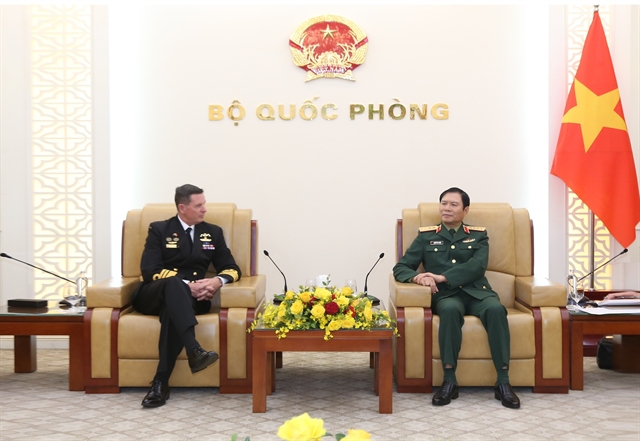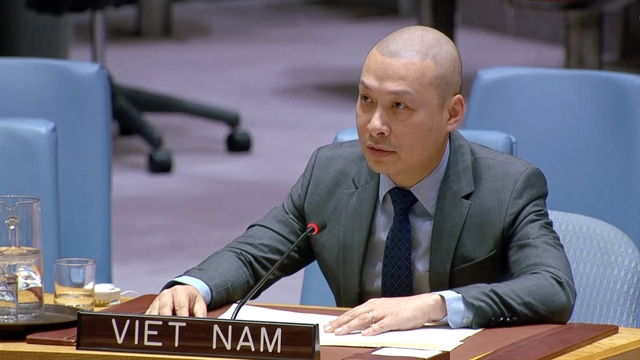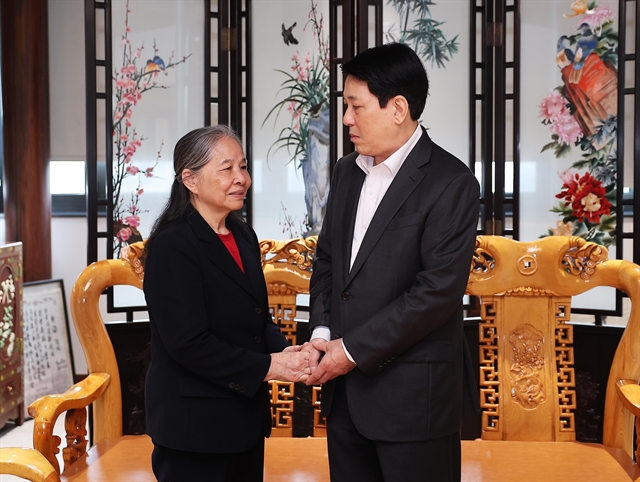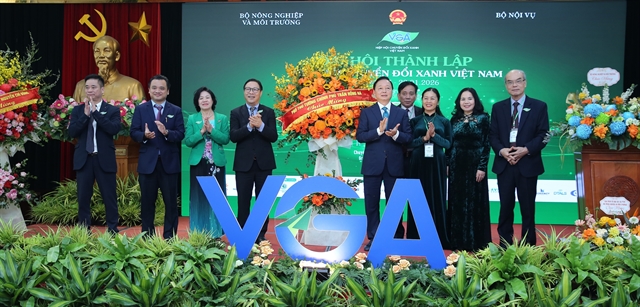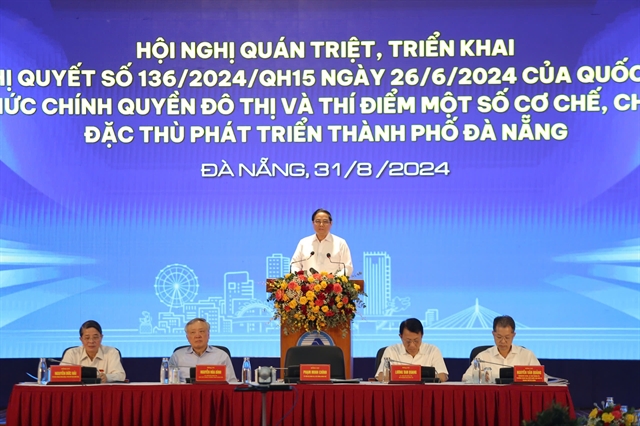 Politics & Law
Politics & Law
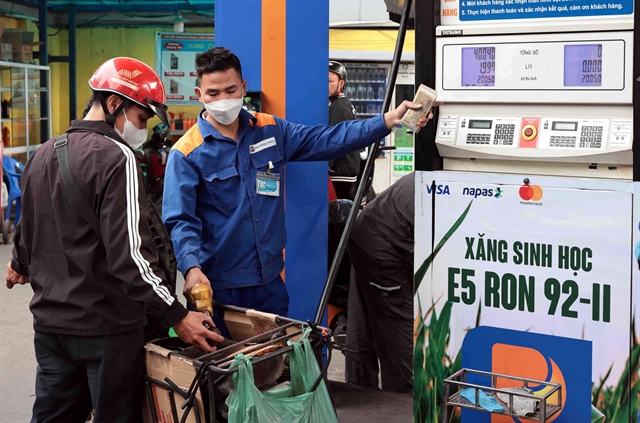
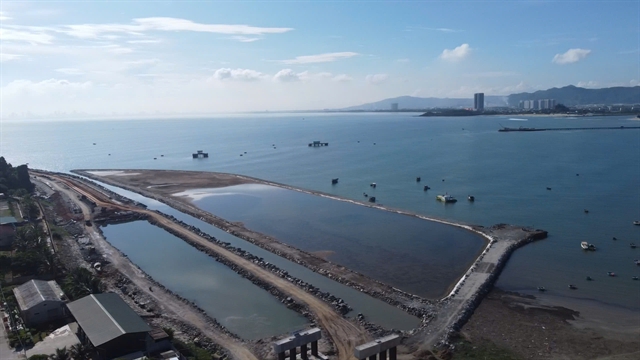 |
| Liên Chiểu deep-sea port under construction in Đà Nẵng City. The central coastal city will develop a free trade zone in link with sea and air ports as well as logistics and production. — Photo courtesy of Giao Liên |
ĐÀ NẴNG — The establishment of a Free Trade Zone (FTZ) in a model of an integrated economic urban area linked to a deep-sea port, a logistics zone and a production, trade and service zone will help Đà Nẵng become a national and ASEAN regional centre of logistics and transhipment.
Vice chairman of the city’s people’s committee Trần Chí Cường made the pledge at the Forum on Free Trade Zone – a new driver of the development of Đà Nẵng Ciy’s logistics sector. He stressed the important role of logistics and multi-transport service, as well as an attractive target for global investment in the future.
Cường said the city now has a green light from the National Assembly on urban governance and specific mechanisms-policies for the development of Đà Nẵng City, building it as a prototype of the first ever FTZ, before applying the model in other provinces and cities.
“The city has been awarded advantage implementation rights in boosting dramatic economic growth in history, turning it into a key attraction of investment, logistics, production and export base for giant international investors and domestic groups,” he said.
“Đà Nẵng will take it all the way to accelerate the long-term economic growth on the basic power of the on-going construction Liên Chiểu deep-sea port, airport logistics centre, and a series of industrial parks and inland depots.”
Vice minister of Industry and Trade, Trương Thanh Hoài said the Đà Nẵng FTZ has been designed as a first sample, a magnet for attracting global investment and production, helping the city’s logistics industry integrate deeper in the global logistics chains.
The city experienced stable growth from 2011-21, averaging between 7 to 9 per cent, responsible for a share from six to 9 per cent in the Gross Regional Domestic Product, he said.
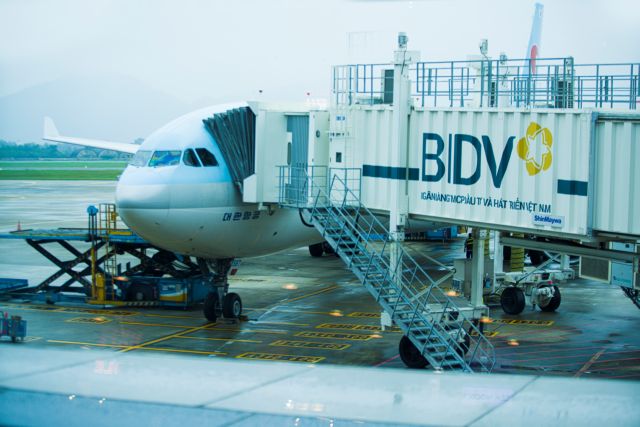 |
| A plane lands at Đà Nẵng International Airport. The city plans to develop an airport logistics centre to serve the free trade zone. — Photo courtesy of AHT |
Đà Nẵng has a natural advantage situated in an important gateway to international maritime routes, he said, adding that the city has developed a logistics ecology of more than 1,000 logistics service businesses.
Bùi Quang Bình, a member of the Đà Nẵng FTZ consultancy group, said that the FTZ will be developed into a key base for foreign direct investors setting up their factories in related to global exports with available deep-sea port and airport logistics service.
Bình said global brand logistics groups including DHL, FedEx, DB Schenker are operating well in Việt Nam, but the Đà Nẵng FTZ should be luring them (logistics groups), expanding investment and logistic bases for global booming demands in the city.
Trần Thị Hồng Minh, director of the Central Institute of Economic Management, suggested that the Đà Nẵng FTZ should look at low carbon, ‘green’ and digital transformation technology industries for long-term sustainable development.
The city should streamline procedures in customs, administration and paperwork, giving priority to investment in hi-tech and ‘renewable’ industries in the FTZ.
Deputy general director of Đà Nẵng Port joint-stock company Lê Quảng Đức emphasised the important role of deep-sea ports in the development of the FTZ.
Đức said the growth of the sea port service and logistics will be a key driving force for the FTZ because it was designed as a centre of export-related manufacture.
“The under-construction Liên Chiểu port should be included in the FTZ as the port will be a key transhipment site for the ASEAN and Asia Pacific region. The port will deliver smooth access to the global maritime route through east-west economic corridors that connect Myanmar, Thailand, Laos and Việt Nam,” he explained.
Đà Nẵng Port handled 750,000 TEUs per year, and it would receive 55 per cent of total commodities through the port in 2050.
Trần Quang Huy, from the Dubai-based DP World logistics company, said the Đà Nẵng FTZ will need infrastructure investment from the State agencies in creating smooth traffic, while customs procedures should be digitalised for investors and businesses.
Nguyễn Nghiêm, from the Mabuchi Motors company, said the Đà Nẵng FTZ needs an extraordinary investment policy and mechanism that make it different to the other regional FTZs.
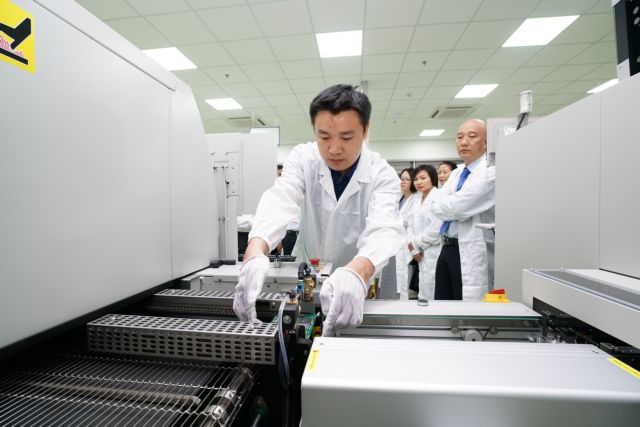 |
| An engineer checks a production line at an electronic factory in Đà Nẵng City. The city has planned for development of a free trade zone and production and logistics centres. — Photo courtesy of Quang Huy |
“The city’s FTZ should call for investment from giant groups that would help attract the other suppliers in manufacturing. The FTZ could form a mega storage centre of material for production and emerging new investment and distribution chains,” he said.
“Our company, which invested in the city 20 years ago, often exports from 180 to 200 TEUs of local-made products, contributing to our production chains for 70 per cent of the global market,” he added.
 |
| A logistics company at the forum on free trade zone development in Đà Nẵng City. —VNS Photo Công Thành |
Đà Nẵng City has been looking for strategic investors with an investment fund from VNĐ2 trillion (US$80 million) to VNĐ8 trillion ($320 million) in the FTZ.
Different locations of key function sites including manufacturing and services, over an estimated area from 1,000ha to 1,500ha, are in the planning stage.
Vice chairman of the city’s People’s Committee Cường said the FTZ project plan will be submitted to the Prime Minister for approval by the end of 2024, and the FTZ would be officially introduced in the first quarter of 2025. — VNS

